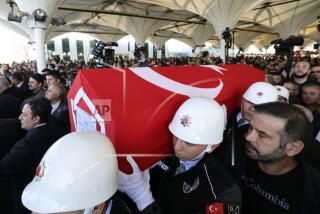Salvador Rebels Kill 4 in Daring Raid on Capital Base : National Guard Chief Among 35 Wounded in Worst Attack in City in Almost 8 Years
- Share via
SAN SALVADOR — In a daring daytime raid, rebel forces attacked a large military base Tuesday in downtown San Salvador, killing at least four guardsmen and wounding 35 people, including the commander of El Salvador’s National Guard. It was the most serious attack in the city in almost eight years.
Setting off car bombs and firing mortars, the guerrillas, presumably members of the Farabundo Marti National Liberation Front, hit the National Guard headquarters in the central neighborhood of Atlacatl in mid-afternoon.
At least one mortar round struck the ammunition dump inside the high-walled complex, setting off a series of secondary explosions that lasted nearly an hour and caused near-panic among the estimated 1,200 troops stationed at the base. Four of those wounded were civilians visiting the base.
Mess Hall, Barracks Hit
Other shells struck a mess hall and an adjoining barracks, destroying the structure and setting off fires. At least three badly burned bodies were seen in the wreckage. Soldiers also reported that the cook was killed by a mortar fragment.
Among the wounded was Col. Jose Humberto Gomez, head of the National Guard, a 3,000-member force normally used to provide security in rural areas for plantations and businesses. The guard is widely charged with terrorizing peasants who are suspected of helping or sympathizing with the guerrillas.
Although the FMLN, as the guerrilla group is commonly known, has struck at military bases recently, including an attack in September on a brigade headquarters in the province of Chalatenango, it has refrained from attacking major facilities in the capital. Officials said the last such raid in San Salvador came in January, 1981, with an attack against the same National Guard headquarters.
Tuesday’s action coincided with the swearing-in of Col. Rene Emilio Ponce as the new military chief of staff. It seemed designed to show that the guerrillas, who generally have limited their recent actions to small, hit-and-run attacks and urban terrorism, have the organization and strength to carry out substantial operations even in the heavily guarded capital.
The raid was embarrassing for Ponce because he has boasted that the FMLN no longer has a serious military capability and is reduced to hitting targets “that can’t shoot back,” meaning the telephone and electrical lines that are bombed on a nightly basis here.
One mortar shell Tuesday fell outside the base and damaged a nearby house, and a car bomb destroyed two other vehicles, broke windows in surrounding homes and injured three civilians. Another car bomb that could have caused heavy civilian casualties was dismantled.
The timing and methods indicated that the attack was intended to embarrass rather than to cause serious damage. The guerrillas made no attempt to enter the base. And if the mortars had struck when the troops were asleep, there could have been more casualties in the destroyed barracks, which house at least 200 men.
There was no real effort to ambush the hundreds of troops who ran into nearby streets, firing at random and showing little sign of organization.
Warning in October
The FMLN in early October warned that it intended to turn San Salvador into a war zone as part of a major offensive planned for October and November. But until Tuesday, the offensive in the city consisted of bombings of movie theaters, restaurants, brothels and public utilities, and in killing soldiers guarding buses and buildings.
These attacks, along with the kidnapings and murders of mayors and attacks on small military units and bases in the countryside, had increased the violence in El Salvador to its highest level in last two years. But the Salvadoran military and the U.S. Embassy had said the guerrilla strategy was a sign of weakness and desperation, not strength.
The Tuesday attack, however, showed that the guerrillas have the tactical ability, including at least the tacit support of civilians in the neighborhood, to carry out threatening operations.
More to Read
Sign up for Essential California
The most important California stories and recommendations in your inbox every morning.
You may occasionally receive promotional content from the Los Angeles Times.












